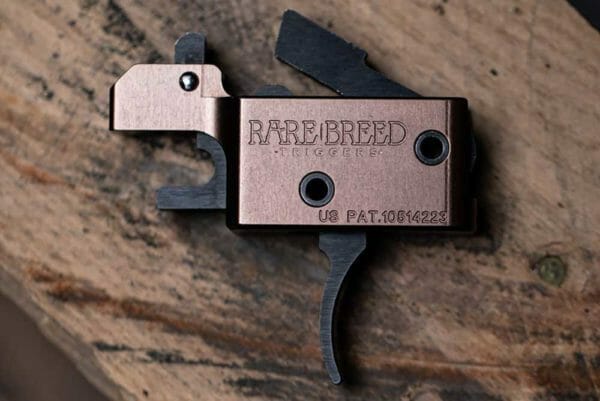
GAINESVILLE, FL -(Ammoland.com)- A judge in the patent infringement lawsuit has asked the Bureau of Alcohol, Tobacco, Firearms and Explosives (ATF), the US Patent Office, and the Department of Justice (DOJ) to weigh in on Rare Breed FRT-15 trigger.
Rare Breed Triggers sued Big Daddy Enterprises, the parent company of Big Daddy Unlimited (BDU) and Wide Open Trigger. The trigger manufacturer claimed that the giant firearms retailer ripped off the design of the Rare Breed FRT-15 trigger for its Wide Open Trigger (WOT). Big Daddy Enterprises denied those allegations claiming that the design of the WOT was not based on any of Rare Breed Triggers’ patents.
In a recent filing, BDU lawyers made several accusations against Rare Breed Triggers. Some firearms influencers claimed that the company sided with the ATF by insisting that the Rare Breed FRT-15 was a machine gun. Tony McKnight, Big Daddy Enterprises President, vehemently denied those allegations. He says that the attorney was just referencing the ATF’s claim.
The controversial line reads: “Foster functions on the same mechanical principle, but it includes a disconnector that prevents the automatic-fire attainable with the FRT-15. Thus, the ATF determined the Foster trigger is not a machine gun (even though it doubles the rate of fire), and it continues to be marketed by Mr. Foster’s company, Fostech. The only real distinction is Plaintiffs willingness to operate outside the law, not any technical improvement.”
The judge in the case did note in the request to the government agencies that neither party believes FRTs to be machine guns.
The Judge wrote: “The plaintiffs and defendants assert such triggers are not machineguns. No party in these cases has asserted or can be expected to assert that the triggers are illegal, and thus no party has briefed or can be expected to brief questions such as whether a party can recover for patent infringement based on sale of an illegal product.”
Whether or not BDU’s lawyers called the FRT-15 a machine gun is up for debate. What is not up for debate is that the judge has now engaged with the government to get its opinion on the FRT-15. Rare Breed’s case will be jeopardized if it is determined the company cannot collect damages on a patent infringement case involving an illegal item, and if the judge believes the FRT-15 to be a machine gun.
The ATF issued Rare Breed with a cease-and-desist order last year, demanding the company stop selling its popular trigger. The ATF claimed to have determined that the FRT-15 was a machine gun during a criminal examination. Rare Breed ignored the demand and kept selling the trigger. Later the ATF sent out an advisory to all law enforcement agencies about force reset triggers saying that the trigger converted an AR-15 to a machine gun. The ATF included pictures of the FRT-15 and BDU’s WOT in the notice.
The ATF then contacted federal firearms licensees (FFLs), warning the gun shops that “some” forced reset triggers are machine guns. The notice didn’t list any specific triggers, but because of the ATF’s previous actions, such as showing up at Big Daddy Unlimited to seize triggers like the FRT-15 and the WOT, many FFLs stopped carrying the triggers.
Last month the ATF charged a man with violating the National Firearms Act for having machine guns. In a DOJ press release, the government called force reset triggers machine guns. One of those “machine guns” was a Rare Breed FRT-15.
Then a few days ago, the ATF started showing up at the doors of gun owners who purchased FRT-15 triggers on Gun Broker to confiscate the item. The ATF obtained the information by pressuring the sellers to turn over their customer records. The confiscations are now limited to the Rare Breed FRT-15 trigger.
If the ATF or DOJ issues an Amicus brief stating that the FRT-15 is a machine gun, that would demonstrate that the ATF is willing to step up its attacks on force reset triggers. Judges and prosecutors might consider it a green light to start charging gun owners with NFA violations. Even though that is not a sure thing, gun owners should be aware of the impact of the brief.
Lawrence Demonico, President of Rare Breed Triggers, declined to comment on the advice of his attorney. Tony McKnight, President of Big Daddy Enterprises, said the company would release a video addressing the case and controversy soon.
About John Crump
John is a NRA instructor and a constitutional activist. John has written about firearms, interviewed people of all walks of life, and on the Constitution. John lives in Northern Virginia with his wife and sons and can be followed on Twitter at @crumpyss, or at www.crumpy.com.

from https://ift.tt/nyFrGCY
via IFTTT

No comments:
Post a Comment